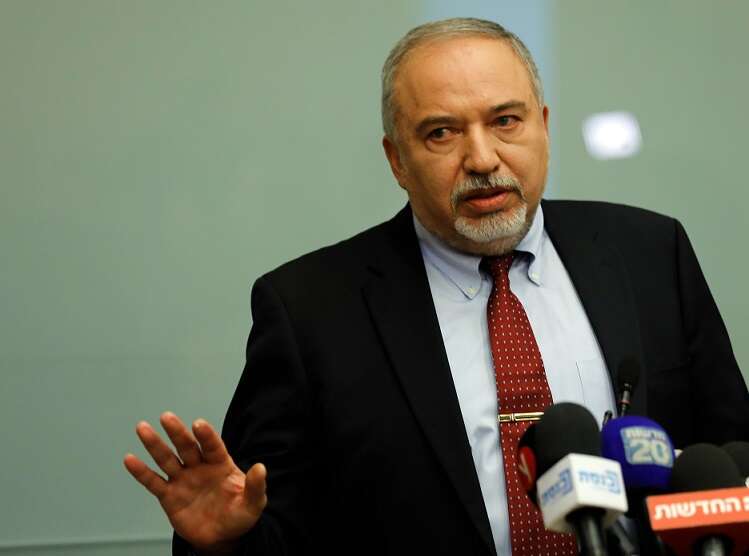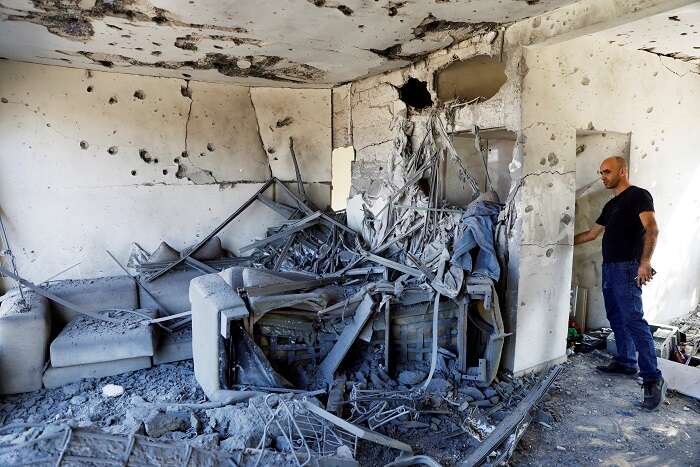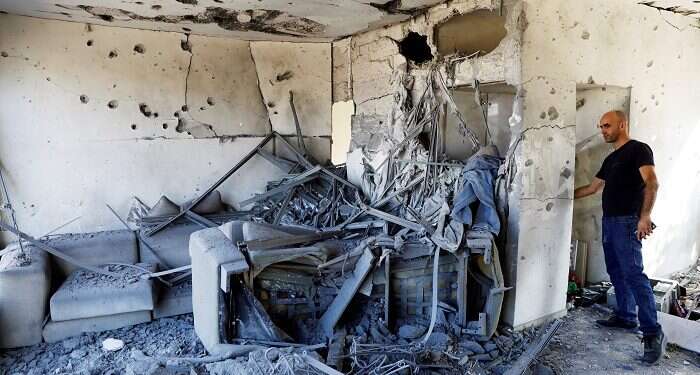The past week has been insane, even by the standards of Israeli media hysterics. The week began with a lull in the Gaza Strip, continued with a covert military mission gone awry in the southern Gaza neighborhood of Khan Yunis, escalated into two days of the fiercest fighting seen on the Israel–Gaza border since 2014, and ended with Yisrael Beytenu leader Avigdor Lieberman stepping down as defense minister and potentially even early elections.
The main beneficiary of this week's events is, undoubtedly, Hamas. Gaza's rulers may claim otherwise, but the reality is that they sustained far more damage and casualties than their 460 projectiles caused Israel.
The bigger picture, however, was what gave the Islamist terrorist group one of the few shining moments it has marked in recent years. This is unlikely to afford it real breathing room in terms of the dire economic situation in Gaza, but in the Middle East, one's image plays a prominent role and this week, Hamas won the battle of perception.
It is not for nothing that Hamas chose to feature a Hebrew slogan on its website this week, reading, "The Kornet beat the cabinet" – referring to Tuesday's incident when the terrorist group fired a Kornet anti-tank missile on a bus that only moments prior had 30 Israeli soldiers on board.
But Lieberman's resignation was undoubtedly Hamas' greatest achievement in this round of violence.
The short period of time that passed between both sides agreeing to hold fire and Lieberman's resignation left no doubt as to the cause and its effect, and this is before Lieberman himself named the government's inaction in Gaza as the reason for stepping down.

It is unclear when Lieberman's positions took the turn that led to his resignation and whether it was really the result of the government's policies or his own sense of frustration. The violence on the Israel–Gaza border has been simmering for nearly eight months and for most of them, he was both proponent and defender of a restrained Israeli response, explaining to anyone willing to listen why Israel cannot afford to be dragged into a war that would yield nothing, and why it is imperative to keep the peace on the southern border, so as not to distract attention from the northern border.
But in recent weeks, he changed his tone and his tune. Not only did he begin advocating a harsh response in Gaza, he aggressively marketed his opinions. The public barbs traded with Habayit Hayehudi leader Naftali Bennett over who would tout a harder line against Hamas were only one sign of this change and another was his frequent statements contradicting the Diplomatic–Security Cabinet's official statements. Lieberman became adversarial to both Prime Minister Benjamin Netanyahu and to the government itself.
This is not a situation a defense minister can sustain for long. Everyone could smell the blood in the water: The military echelon began seeing him as irrelevant and opted to work directly with the prime minister; the other ministers sensed he was politically vulnerable and went for the proverbial jugular in the media; and Lieberman, who wanted to be defense minister to gain power in the office second only to the prime minister's, felt he was losing control over it, and decided to cut his losses and resign.
It is doubtful that Lieberman understood the magnitude of the gift he was giving Hamas. In 2006, following the Second Lebanon War, Hezbollah sent an Israeli defense minister and a chief of staff packing, but that was after 35 days of fighting and 144 Israeli casualties. It only took Hamas two days.
Money talks
The covert mission that claimed the life of Lt. Col. M. was Hamas' second achievement this week. The result of the botched intelligence–gathering mission could have been far worse, potentially including more Israeli casualties and abducted soldiers, prevented only thanks to the resourcefulness of the troops, who exhibited extraordinary courage and were able to extract themselves from the extremely dangerous situation in which they found themselves.
Still, a covert operation that was blown and ended with one dead officer and a wounded officer cannot be considered successful. Hamas may have lost seven operatives, including the commander of its Khan Yunis operations, but it dealt the IDF a stinging blow.
Moreover, it felt legitimized to embark on a violent rampage because it was Israel that violated the Egyptian–brokered truce achieved only two days earlier with great effort.
The fact that Hamas, despite its unprecedented aggression, still carefully calculated its moves shows that it has no interest in a full-fledged war with Israel.
The terrorist group fired hundreds of rockets on Israel's south, but kept its range limited to the Israeli communities near the border. The anti-tank missile fired at the military bus was equally calculated: An IDF inquiry into the incident found that the missile was fired only after Hamas saw the soldiers had disembarked from the bus and the cell that fired it did not target any of the surrounding vehicles.
This led the IDF to believe Hamas sought to send a message without risking multiple Israeli casualties, something that would guarantee a massive Israeli response.

The Israeli Air Force, for its part, struck 160 Hamas assets and over a dozen Islamic Jihad targets in Gaza, including Hamas' Al–Aqsa TV headquarters in Gaza City, and the group's intelligence headquarters and internal security building, as well as several weapon arsenals.
The military spared no effort to minimize Palestinian casualties, so as not to give Hamas reason to expand the range of its rocket fire, but the damage it inflicted on Hamas infrastructure far outweighed the $15 million in Qatari aid funds that entered Gaza last week.
This money transfer gave Hamas quite the headache. Many Palestinians saw the move as one when Gaza's rulers sold themselves cheaply; the images of the three small suitcases entering Gaza opened every news report in the Arab world and the narrative was clear: The Jews were controlling Hamas via Arab money.
The flare-up allowed Hamas leaders to clean their conscience and restore the aura of freedom fighters they so carefully promote. But make no mistake – this was only a temporary remedy. They still have to pay salaries next month and their headache will likely return.
On the fence
The true heroes are, as usual, the Israeli residents of the Gaza–vicinity communities. Operation Protective Edge in 2014 gave them 44 months of much–needed peace and quiet after years of something that can only be described as a war of attrition. All you had to do was look at the positive urban migration noted in every community in the western Negev to know something good was happening there.
All this went wrong on March 30, when Hamas launched its border riot campaign. Things got worse the following month, when the Palestinians introduced arson terrorism into the equation, scorching thousands of acres of forest and farmlands. Multiple rounds of violence followed, and once again, life on the Israeli side of the border began revolving around the ebb and flow of the fighting.
The government calculated its steps carefully – the opposition would say hesitantly – but the overall understanding was that nothing good would come of yet another military operation in Gaza that, at best, would end with a tie and will bring everyone right back to where they started.
Even ministers who publicly preached dealing Hamas a harsh blow were averse to it in cabinet meetings and the consensus was that the current situation required prudent risk management and was the lesser of all evils.
This line of action makes sense if it is backed by broad strategic thinking. Those who criticize the IDF for its proposed course of action should be fair and say that it was only part of a broader proposal that included devising solutions to the situation in Gaza that go beyond a small addition of diesel fuel for electricity.
The idea was to embark on a broad process that would lead to the rehabilitation of Gaza and produce the desired peace and quiet. This could have been achieved vis–à–vis Hamas, Palestinian Authority President Mahmoud Abbas, the Egyptians and the international community, or any combination thereof. The Israeli government chose not to pursue this avenue, preferring instead to manage a protracted crisis, knowing it meant it will continue to put out increasingly growing fires.
Lieberman tired of all of this and decided to resign, but the problem remains. This week's cease-fire, like those before it, will face its first test on Friday, as masses of Palestinians will gather near the security fence, as they have been doing every Friday for the past eight months.
As usual, they will try to challenge IDF troops, who, in turn, will try to fend them off. During Monday and Tuesday's fighting, the IDF tried to re-establish the security perimeter near the fence and has been aggressively maintaining it since.
Still, Friday will be the true test, as it is doubtful that Hamas – still basking in its "victory" – will do anything to restrain the protesters. It is equally doubtful the IDF would be eager to inflict casualties, wary that the south might come under fire as a result.
The hope is that the demonstrations will somehow go over with minimal drama and the focus could return to talking about economic aid.

If this happens, the next stage will be discussing longer-term mechanisms with aim of preserving the cease-fire, curb the border protests, and eliminate arson terrorism. Israel will also demand the return of the two captives held in Gaza and the remains of two Israeli soldiers, which would likely be presented as a condition for any progress on major rehabilitation projects in Gaza.
This path is essentially a minefield, and the chances of failure are much greater than the chances of success. Netanyahu chose to pursue this path knowing the price of the war – the Israeli public applauds its leaders and military as the fighting begins and demands commissions of inquiry as it wanes.
Netanyahu is experienced enough and cautious enough to understand that this is a dangerous recipe for a leader in an election year, certainly when he has no trick up his sleeve to ensure a military operation in Gaza would yield the perfect result.
Filling the vacuum
Lieberman's term as defense minister was anemic and he left no significant mark on the defense establishment. It was easier for him to deal with the civil servants in the office, where he was able to effect change on issues pertaining to homefront defense and preserving the financial framework of the defense budget.
Dealing with the military echelon proved difficult for him and while he was able to work with IDF Chief of Staff Lt. Gen. Gadi Eizenkot well, those in uniform always saw him as a stranger among them.
Nevertheless, his resignation created a vacuum. Israel needs a full–time defense minister, one who can lead the defense establishment, ask questions, challenge it and, if need be, call it out and take it to task.
In principle, there is nothing to prevent the appointment of a civilian as the next defense minister – the precedent exists and with good results – but at a time like this, the system requires a stabilizing hand.
A new chief of staff is poised to take office on Jan. 1 and having a novice as defense minister is a recipe for a potential disaster, especially at a time when Israel's leeway in both the southern and northern sectors is narrower than ever. Logic demands appointing someone who knows the defense establishment and won't require too long of a grace period.
On the other hand, there is a demand for change; for a fresh set of eyes that would see things differently and suggest different policy.
But even if the appointment meets this demand, it is doubtful whether the outcome would be any different. Past experience has proved that when a new minister enters the Defense Ministry, he is overwhelmed by the air of sanctum sanctorum and often changes his perception of things.
Lieberman learned this lesson first hand, as will his successor. Wars, you see, cannot be fought, let alone won, with mere slogans.




